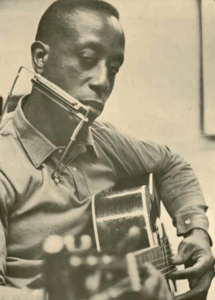Doctor Ross facts for kids
Quick facts for kids
Doctor Ross
|
|
|---|---|

Ross in 1965
|
|
| Background information | |
| Birth name | Charles Isaiah Ross |
| Also known as | The Harmonica Boss |
| Born | October 21, 1925 Tunica, Mississippi, U.S. |
| Died | May 28, 1993 (aged 67) Flint, Michigan, U.S. |
| Genres | |
| Occupation(s) |
|
| Instruments |
|
| Years active | 1942–1993 |
| Labels | |
Isaiah Ross (born October 21, 1925 – died May 28, 1993) was a cool American blues musician. He was famously known as Doctor Ross. What made him special was that he was a one-man band. This means he could sing, play the guitar, harmonica, and drums all at the same time! His unique style has been compared to other famous blues artists like John Lee Hooker.
Contents
Early Life and Nickname
Charles Isaiah Ross was born in Tunica, Mississippi, on October 21, 1925. He grew up in a farming family with ten brothers and sisters. When he was nine years old, he started playing the harmonica.
Ross served in the United States Army for several years. After leaving the army, he got married. During his time in the army, Ross collected many medical books. He also carried his harmonicas in a special doctor's bag. Because of these things, people started calling him "Doctor Ross."
Music Career
Doctor Ross began his music career in 1942 when he was just seventeen. He started by broadcasting on the radio station KFFA in Helena, Arkansas. After his army service, he often played at parties and appeared on other radio stations like WROX and WDIA.
In 1951, Ross made his very first recording. It was a 78 RPM record called "Country Clown." This record was produced by Sam Phillips in Memphis. It was released on the new Chess label. Ross later released two more songs with Phillips on Phillips' own Sun Records label in 1953 and 1954.
In October 1954, Doctor Ross moved his family to Flint, Michigan. He started working at a General Motors factory. He kept this job for the rest of his life. This job helped him have a comfortable life. In 1958, Ross recorded a song called "Industrial Boogie." This song was about Flint and was inspired by John Lee Hooker's "Boogie Chillen'." He released it on his own record label, DIR.
From 1960 to 1963, Fortune Records in Detroit released four more songs by Ross. One of these was "Cat Squirrel" in 1961. This song became popular with rock music fans. It was even covered by famous bands like Cream and Jethro Tull on their first albums.
After these recordings, Doctor Ross started recording many of his songs by himself. He would sing and play the guitar. He also used foot pedals to play the hi-hat and bass drum. He played the harmonica using a neck rack. Ross was left-handed, so he played a right-handed guitar upside down. This meant the bass strings were on the bottom, which was very unique!
Doctor Ross's first album was called Call the Doctor. It was recorded as a one-man band and came out in 1965. In the same year, he toured Europe with the American Folk Blues Festival. In 1971, he released his second album, Doctor Ross the Harmonica Boss. He also recorded live albums in Germany and Switzerland in 1972. Two years later, Ross performed on the Big Bear Records tour and album American Blues Legends '74.
In 1981, Doctor Ross won a Grammy Award! He won for Best Ethnic or Traditional Recording. This was for his appearance on Rare Blues, a collection of blues songs recorded between 1963 and 1965. Later in his career, Ross often performed at blues festivals. He played in both the United States and Europe. His last album was recorded live in 1991 at a festival in England.
Death
Doctor Ross passed away on May 28, 1993, at the age of 67. He was working at a Chevrolet plant in Flint, Michigan, when he died. He was buried in Sunset Hills Cemetery in Flint Township. After his death, a music scholarship was created in his name at Mott Community College in Flint.
Discography
Studio albums
- Call the Doctor (Testament, 1965)
- Doctor Ross the Harmonica Boss (Fortune, 1971)
- Jivin' the Blues (Big Bear, 1974)
Live albums
- The Flying Eagle (Blue Horizon, 1965)
- Live + Well (Ornament, 1972)
- Live at Montreux (Polydor, 1972)
- The Harmonica Boss (Big Bear, 1974)
- One Man Band (Takoma, 1981)
- I Want All My Friends to Know (JSP, 1991)
Singles
- "Country Clown" / "Doctor Ross Boogie" (Chess, 1952)
- "Come Back Baby" / "Chicago Breakdown" (Sun, 1953)
- "The Boogie Disease" / "Juke Box Boogie" (Sun, 1954)
- "Industrial Boogie" / "Thirty-Two Twenty" (DIR, 1958)
- "Sugar Mama" / "I'd Rather Be an Old Woman's Baby Than a Young Girl's Slave" (Fortune, 1960)
- "Cat Squirrel" / "The Sunnyland" (Fortune, 1961)
- "Cannonball" / "Numbers Blues" (Fortune, 1963)
- "Call the Doctor" / "New York Breakdown" (Fortune, 1963)
Compilations
- His First Recordings (Arhoolie, 1972)
- Memphis Breakdown (P-Vine, 1987)
- Boogie Disease (Arhoolie, 1992)
- The Harmonica Boss (Fortune, 1995)
- Juke Box Boogie: The Sun Years, Plus (Bear Family, 2013)

